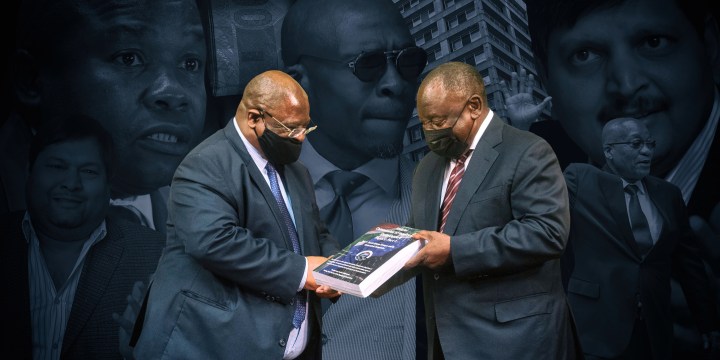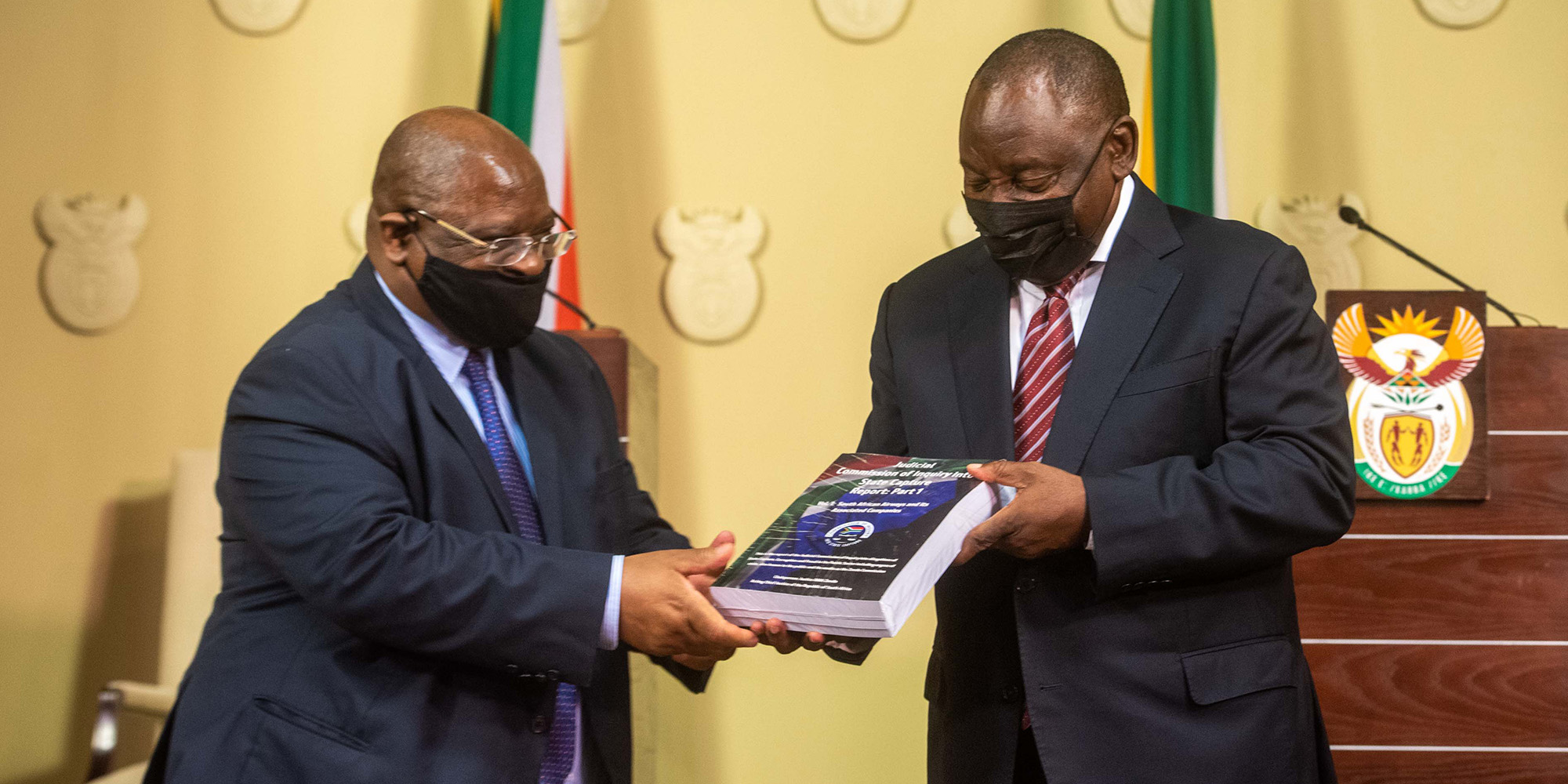CIVILIAN COALITION
Civil society on what Zondo Commission and State Capture report got right and wrong

The Collective Civil Society Response to the Zondo Commission and the State Capture Report was released on Wednesday. It said that while the Zondo Commission’s successes should be replicated in future commissions, it had missed several opportunities as accountability for State Capture remains elusive.
“The struggle against State Capture and corruption in South Africa is a struggle for human rights. This is why continued commitment to the implementation of the Zondo Commission’s recommendations and the vigilance of civil society remain important,” reads the Collective Civil Society Response to the Zondo Commission and the State Capture Report.
Released on Wednesday, 6 March, the Civil Society Working Group on State Capture looks at the role of commissions of inquiry in our society; the successes of the Zondo Commission; the gaps or challenges experienced by the commission; and some of the lessons learnt. It also highlights civil society’s reflections on some of the key recommendations of the Zondo Commission.
The Civil Society Working Group on State Capture was established in November 2018 and is a coalition of more than 20 civil society organisations, including Corruption Watch, Judges Matter, SECTION27, the Public Affairs Research Institute and the Centre for Applied Legal Studies – all united in their stance against the looting of public funds and committed to promoting the interests of the public.
What the Zondo Commission got right
The Civil Society Working Group on State Capture report noted that the Zondo Commission made several robust findings and recommendations, which implicated prominent politicians, politically connected people, private companies and state-owned enterprises that enabled and benefitted from State Capture crimes.
Many of the recommendations call directly for criminal investigation with a view to possible prosecution and, because of this, the commission has been an important step towards proper accountability for State Capture.
“The exhaustive and far-reaching focus of the commission means that its report provides a fairly comprehensive account of State Capture and the patterns of corrupt activity that took place at various state-owned enterprises and state institutions,” says the Civil Society Working Group on State Capture report.
The Zondo Commission also illustrated that the patterns of corruption were not isolated to relationships within the state, but also extended to include relationships between the state and the private sector as well.
The exhaustive manner in which the commission sought out and considered evidence of State Capture should be commended.
“What is more, it did this despite the pressure it faced over the course of its proceedings. The chairperson of the commission and evidence leaders undertook the work of the commission with commitment and integrity.
“Additionally, the commission cast the net wide in terms of implicated and associated parties and stood its ground, for the most part, when witnesses were obstructionist or contravened its terms of reference and the rule of law,” said the report.
The commission also played a key role in ensuring that its proceedings were accessible to the media and open to contributions from civil society.

President Cyril Ramaphosa receives the first part of the report of the Judicial Commission of Inquiry into Allegations of State Capture from the Commission’s Chairperson, Acting Chief Justice Raymond Zondo, 4 January 2022, at the Union Buildings. (Photo: Alet Pretorius)
Lessons learnt
The report said the work done by the commission was a good reminder of the power and value of a well-run commission of inquiry.
It also noted that commissions with a scope as broad as Zondo’s needed to be adequately resourced from the start, as failure to do so could hinder their progress.
It said the rules drafted by Chief Justice Raymond Zondo ensured fair processes and it should be mandatory for commissions to have fair processes and allow for legal representations to be made.
In future commissions, if the scope of inquiry is as wide-ranging as the Zondo Commission, the best approach could be to tackle one stream of evidence at a time, conclude that stream, and timeously provide interim reports.
The archive of the Zondo Commission is a vital resource, and it would be in the public interest to preserve and make this information accessible to all.
Read more in Daily Maverick: A library like no other: Zondo Commission records get a home
Where the Zondo Commission fell short
The report noted that while the work of the Zondo Commission was commendable, there are areas of concern, with the main weakness being the commission’s “unevenness”.
“The attention paid to different facets of State Capture was uneven and certain areas were under-served. This was exacerbated by a lack of public communication. The underlying logic for what the commission chose to investigate or chose to exclude was never clarified.
“There was a disproportionate allocation of time for some witnesses and evidence streams, at the expense of others. While the commission summoned and grilled numerous politicians and public officials in this way, it did not do the same for the numerous chief executive officers of large private companies implicated in State Capture,” the report said.
Read more in Daily Maverick: How the final State Capture report lets South Africa down
The commission missed a vital opportunity to question members of the Gupta family, who offered to appear virtually, but their application was denied by the chairperson.
“The fact that the Guptas and one of their chief associates, Salim Essa – all of whom were implicated in many instances of State Capture crimes – did not testify and could not be cross-examined was a huge loss,” the Civil Society Working Group on State Capture report said.
The commission took a lengthy period to conclude the inquiry, experiencing multiple delays, some of which were due to external factors, but others were the result of inefficient internal processes.
“While several applications were made to extend the commission’s timelines, there were instances where some witnesses testified for days and other witnesses were not called at all, and public interest was lost on more pressing issues. The justifications for these decisions were not provided.”
Although the commission did well in illustrating how private sector actors such as global consulting firm Bain & Company had enabled State Capture at South Africa’s tax agency, more could have been done to catalogue the full extent to which the private sector provided the necessary infrastructure for State Capture.
“In particular, the commission failed to properly investigate the private sector’s role in money laundering activities.
“This was a missed opportunity in two ways. First, it failed to deliver an initial factual basis for law enforcement that could inform investigations and/or prosecutions against financial institutions and those who run them.
“Second, it left the state, as a whole, uninformed as to the effectiveness of South Africa’s anti-money laundering legislative and institutional framework,” read the report.
It said the commission did not sufficiently discuss the political manipulation of criminal justice agencies and the significant impact of State Capture on those institutions, and could also have done much more to communicate the cost of State Capture.
“A section in its report dedicated to outlining the financial and social costs would have been powerful. Instead, the report fails to consider and detail the ways in which State Capture affected the people of South Africa, with the most severe impacts felt by the most vulnerable in our society.”
Implementation and response to recommendations
The report included recommendations that the Civil Society Working Group on State Capture believes should be prioritised for implementation and key areas of concern arising from the findings.
The Civil Society Working Group on State Capture welcomed President Cyril Ramaphosa’s acceptance of the commission’s findings concerning the existence, nature and extent of State Capture, but strongly disagreed with the president’s conclusion that State Capture is “in the past” and has effectively come to an end.
The commission made virtually no recommendations on the criminal justice system, despite its finding that State Capture was facilitated by an effort to subvert and weaken law enforcement and intelligence agencies for illicit activities.
The report noted that while the National Anti-Corruption Advisory Council, established in 2022, has been given a mandate to rethink the anti-corruption institutional architecture, “the current system remains extremely vulnerable”.
Read more in Daily Maverick: Zondo concerned by no sign of public procurement anti-corruption agency 16 months after State Capture report
The Zondo Commission presented strong opportunities for law enforcement agencies to hold perpetrators of State Capture crimes to account.
However, while progress has been made by institutions like the SIU, there has yet to be a successful prosecution of a State Capture case by the NPA.
Read more in Daily Maverick: State Capture investigations at SOEs struggle amid lack of investigative and forensic skills, Scopa hears
The Civil Society Working Group on State Capture called for “urgent, deliberate and targeted reform in critical law enforcement agencies, in which there should be a prioritisation of State Capture cases”.
The Civil Society Working Group on State Capture also called for:
- Urgent reform of key pieces of legislation, such as the Protected Disclosures Act, along with the implementation of incentivised whistle-blowing by the state;
- Parliament to take urgent steps to reform its oversight systems;
- A procurement system that is open, transparent and subject to scrutiny, and
- Transparent mechanisms to ensure that SOE board appointment processes are designed in such a way as to select for appropriate expertise and experience.
Taking the work of the commission forward
The report said the public and civil society must undertake to keep the work of the commission alive and to give it longevity in the public imagination.
“Civil society can track the archiving of commission records and advocate for public access … and use all of the information available in our research and advocacy work,” read the report.
A key way for civil society to take this work forward is to track and monitor the implementation of the recommendations, particularly at key law enforcement institutions and in Parliament.
“The [Civil Society Working Group on State Capture] will be engaged in targeted campaigns that use multiple channels and easily accessible formats. Throughout this we will maintain efforts to highlight why this work matters to the country and continue to do important work to overturn patterns of corruption and poor governance,” said the report. DM




















 Become an Insider
Become an Insider
Nothing of value has yet been derived, we still paying the price and the ANC is not sorry at all. Criminals walk about, they are untouchable and the only beneficiary is Chancellor House.
Correct of course. A monumental and expensive exercise in optics and smoke and mirrors with zero outcome. That is was predictable does not make it any less disgusting.
It is interesting to think about the gradual, slowly accelerating slide into the collapse of a nation. One wonders at what point DO people rise up, in numbers, to resist?
I think it takes starvation and imminent death, otherwise all else is tolerated. Zimbabwe is a good example, so to Nigeria. Places like that, or the Yemen, where anarchy reigns. Where will we be, in 10, or 20 years? Does anyone care to speculate?